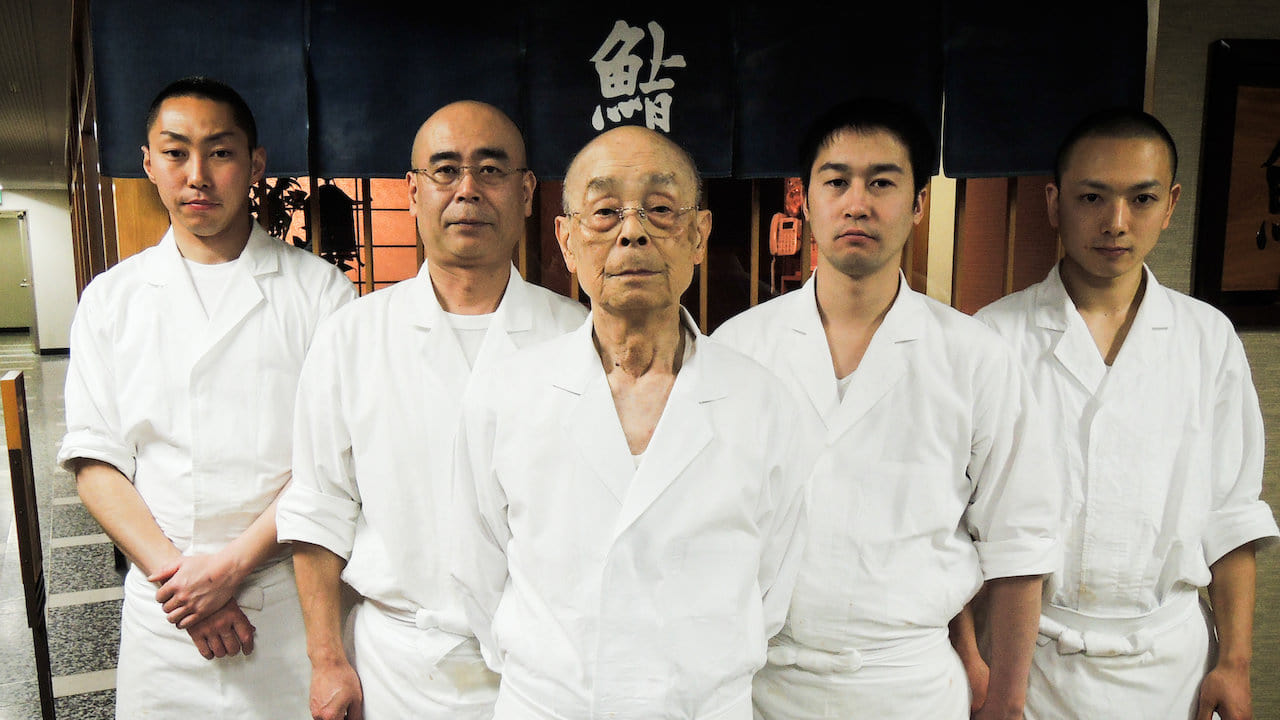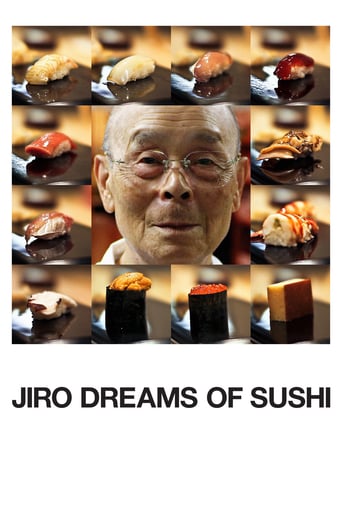sharky_55
Blink on your daily Japanese commute and you might miss Jiro Ono's Michelin three-star restaurant, Sukiyabashi Jiro. The modest ten- seater is tucked away underground near the Ginza subway station, and as a bumbling out-of-towner demonstrates, it is not so hard to mistake it for any ordinary sushi bar. In fact, with a month-long booking, fifteen minutes and a week's salary or so, you could be in and out of there during your lunch break. Jiro has never compromised his artistic integrity by expanding his trade or accommodating more customers for profit. Everything in his restaurant has its place and role, and like his courses there is no excess (he portions the food so that groups finish their meals at the same time). Director David Gelb talks about the meticulous setting in his commentary; he would move furniture around to accommodate his filming, to compose a better shot, and right on cue, Jiro would hustle over and return the piece to its rightful place. Great artists often immerse themselves so fully into their work that the person behind them disappears, and through biopics and documentaries like Jiro Dreams of Sushi, we are able to glimpse a little of what goes on behind the curtain. Jiro himself might disagree with this objective - he details how it is necessary to devote his entire life to his craft, fall in love with his work, dedicate all his time to mastery of the skill of sushi making. He must have a wife, although it is no coincidence that the film does not show her. Neither is Jiro shot in his home; he loathes holidays, preferring to continue working at the restaurant, and retirement would only bring about boredom. Sushi even invades his dreams, as the title discloses. Here is a man who has not an inkling of a personal life outside his work, and does not seem to be fazed by it. In the few scenes where he is out of the kitchen he almost withers and ages years, muted and made plain outside of his domain. Gelb, doubling also as the film's cinematographer, has taken to care to capture the intricacies of the artistry that goes into preparing Michelin three-star quality sushi. He utilises both slow and fast motion to portray the chefs in their kitchen, as gentle caressers of their ingredients and also efficient, precise workers. He gives us the foodie shots - salmon like glistening gems on smooth lacquer trays - but also understands that food arouses senses other than sight, and includes the sound of sizzles and visualises the steam which reveals how even their rice must be cooked to perfection. When Gelb does indulge in those glossy, magazine-quality shots in shallow-focus, he includes simple titles that present the food as if the screen was a visual menu, and we are about to order. A rhythmic track of drums and ringing bells brings to life the fish market and the chaos surrounding bidding for the best produce. In the kitchen, the soundtrack attempts to elevate the craft of sushi beyond Jiro's modest restaurant - they cook to Bach, to Tchaikovsky, to Philip Glass. But the peculiar thing about Gelb's direction is that he allows Jiro's philosophy to shine through these moments. Hands are wringing octopi in slow motion, water droplets gracefully fly through the air, and the violin croons, but what we hear most of all is Jiro's voice-over, quietly mediating on his life's work, and reaffirming that his goal was never the pursuit of money. The film's view of the artist is simple and unpretentious, a valuable insight in a world increasing dominated by expansion and the dollar value. One particular shot is more telling than any close-up of sushi; Gelb places his camera on the kitchen table as the chefs talk during their lunch break. The fish- eye lens indicates the voyeurism of a surveillance camera, but their conversation is natural, revealing and as far from performance as you can get. See the glee of one apprentice's face as he recounts the tale of finally perfecting an egg dish after two hundred attempts, and his reaction to Jiro's quiet approval. Though Gelb touches briefly on the issue of over-fishing, the past and his son's futures, it is Jiro's story that is at the heart of the film. His ascetic devotion to his craft seeps through every word, and also through generations; his younger son operates his own restaurant nearby (a perfect clone apart from the interior's reversal because he is left handed), while the older, well into his 50s, waits patiently to one day succeed his father. Jiro left his home at a young age, told by his parents to never return a failure, and began selling sushi on the streets of Tokyo. He has never left these roots. Watching the film is like peering through a window into a world with a work ethic most could never fathom. His career is fascinating yet beyond our comprehension. Is this what it is like to find your true calling, is this all there is? How can one be so sure of their life's work? But Jiro makes us sure that this path is etched in stone for him and his successors, and that he has no regrets. He wields his brush like a painter, gently applying shoyu to his dishes, and in Jiro Dreams of Sushi, his work has been immortalised.
Dylan Stek
"Jiro Dreams of Sushi" is a documentary about Jiro, an 85-year old sushi master, who runs his restaurant in the subways of Tokyo.Jiro is a real shokunin, a craftsman who lives his craft fully. He leaves home at 5AM and comes home at 10PM. In between, his careful attention goes only to making the most rich and tasteful sushi there can be. The documentary is an ode to this dedication. It does not try to approach the subject with an intellectual attitude, but rather shows us the world how it must look from the eyes of the master. The whole movie is accompanied by classical music and half of the movie is comprised of shots of the art. Fish being sliced, octopus being massaged, rice being cooked and the sushi being formed. Of course Jiro's sushi is not only the result of his skill and dedication, as nothing in this world is separable from it's environment. The movie investigates the different artisans Jiro buys his ingredients and why exactly they deliver the most sublime ingredients. THe movie investigates the hard and long path that Jiro's apprentices have to take before they can even form their first sushi. And the movie investigates the paths of Jiro's two sons, both following in his fathers footsteps.If you have appreciation for beauty, dedication and the strive for perfection, watch this documentary.

